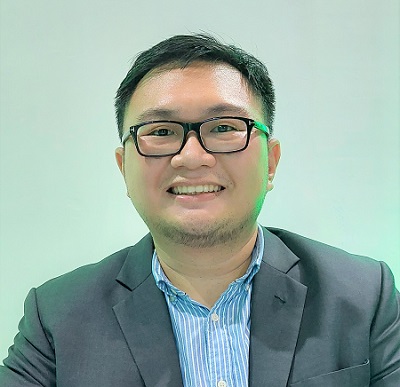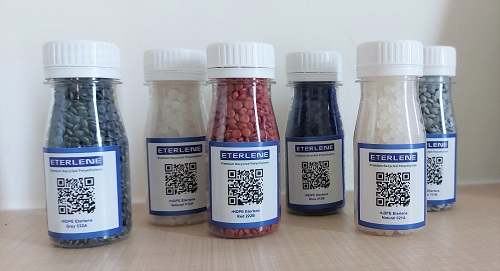Southeast Asia has a fast-growing generation of plastic recyclers who are now pursuing production of recycled plastics to serve the anticipated rising demand for eco-friendly materials. One company that has taken a big leap forward in this area is Pan Era Group, a leading producer of recycled resins in Indonesia. International Plastics News for Asia had the chance to talk to Wilson Pandhika, Pan Era Group’s Director and Secretary General of Indonesian Plastics Recyclers (IPR) on how recycled plastics are gaining acceptance and the move to raise production capacity for eco-friendly materials.
Please tell us about Pan Era Group and its key milestones as a recycler and producer of plastic materials.
Mr. Pandhika: Pan Era Group is one of the largest polyethylene recyclers in Southeast Asia. Our capacity at the moment is 30,000 tonnes per year, and our target is to reach 50,000 tonnes per year by 2025 through the expansion of our production capacity.
We are proud to have reached several key milestones in the past and present. The business was founded in 1987 and was the only one doing plastic waste crushing and trading at that time. It was originally named PD Era Plastik. In 1997, following expansion, we started producing recycled resin as well as plastic bags. The company underwent some reorganisation and was renamed as PT Elastis Reka Aktif.

Mr. Wilson Pandhika, Pan Era Group’s Director and Secretary General of Indonesian Plastics Recyclers
In 2010, we purchased a factory building in Cikarang area and renovation went underway; the following year a new company was founded under the name PT Elite Recycling Indonesia. Together with PT Elastis Reka Aktif, they formed the Pan Era Group. PT Elite Recycling Indonesia also produced recycled PE resin as well as PE film products.
PT Elite Recycling Indonesia installed its first European washing line for HDPE bottle waste in 2015. Our expansion continued, and in 2019, we acquired land in Cikande area and preparation and construction of the new factory began. Another company under our fold was founded under the name PT Eterna Persada Indonesia which was the company that undertook the first production of PE resins in 2021. By 2022, PT Eterna Persada Indonesia reached capacity of 800 tonnes per month (approximately 10.000 tons per year), bringing the total capacity of the group to 30.000 tons per year. In January this year, PT Eterna Persada Indonesia has started installation of the next washing line intended for LDPE film waste and by March, it is scheduled to start construction of a new R&D facility that specialises in researching about plastic recycling.
Our expansion moves continue this year with the commissioning of a new washing line at PT Eterna Persada Indonesia. It is also targeting production of recycled PP by third quarter of this year then by fourth quarter, it will commence installation of production machinery for film productions.
What are the current products of Pan Era that are considered a reflection of its focus on sustainable production?
Mr. Pandhika: Currently, we produce our plastic bags under the Loco brand. These environment-friendly bags are known for their strength and can carry heavy quantities of goods. We offer variants suitable for carrying goods such as rice, eggs or other heavy items. The bags come in various colours and thickness.
But our expansion lately is centred on the production of recycled plastic ore. Our recycled high density polyethylene (HDPE) pellet is resistant to exposure to sunlight, hot temperatures, and cold temperatures. It has the characteristics of strong, hard material, and more resistant to high temperatures. This plastic is suitable for making plastic milk bottles, shampoos, detergents, engine oils and others. By using bottles made from HDPE, the chemical reaction between the packaging and the contents can be minimised so that it is safe to use. Advanced machine technology available today, can be used to recycle HDPE types. As a result, all recycled plastic ore can also be reused to produce plastic products.
Another type of recycled plastic pellet that we offer is low density polyethylene (LDPE), which has the characteristics of strong, flexible, translucent and has protection against water. In general, LDPE plastic is often used for shopping plastic bags (crackles), garbage plastic bags (polybags), plastic wrap, stretch film, drink lids and toys. LDPE plastic has good resistance to chemical reactions and has a lower melting point of 60°C. This LDPE recycling process goes through various stages until it becomes recycled plastic ore. The results of this plastic ore can be reused to become raw material for the production of plastic products.

Pan Era Group develops recycled plastic pellets that are ready for use by consumer goods packaging industry.
What are your target markets for these recycled plastic materials?
Mr. Pandhika: We are looking towards meeting both domestic and foreign demands for recycled materials. With the plastics industry now increasingly moving to achieve circular economy targets, as plastic recycler, Pan Era will continue to introduce innovative approaches and applications for recycled materials.
As one of the largest PE recyclers in the region, we have a range of post-consumer and post-industrial plastic materials that we can offer our customers. Our supply network is spread throughout Indonesia, in many different locations. We are working with more than 200 collectors - mostly in informal sector - doing collection, primary segregation, then compressing then turned over to Pan Era who recycled to high quality pellets. We also have our production for plastic bags and garbage bags.
You are also the Secretary-General of the Indonesian Plastics Recyclers (IPR). Briefly, what were the trends in the country’s plastic recycling during the pandemic and how did the industry cope with the challenges?
Mr. Pandhika: For a couple of years during the pandemic, the IPR as an organisation did not stop in pursuing its goals. The association conducted a lot of online meetings with customers and members. While projects have stalled, we have been trying to keep our industry intact despite the challenges during the pandemic.
The recycling rate in Indonesia during the pandemic is really mixed. For example for PET bottles, people could not travel and events were postponed during the lockdown that consumption of bottled water dropped. This in turn led to PET recyclers encountering shortage of PET waste during that time, although trends have improved now. We see new installations that add more capacity in terms of recycling of PET waste. The problem is that our waste management and collection system is not keeping up with the demand so a lot of PET recyclers are having shortages. For PE, the condition is relatively more stable due to the availability of PE waste. For PP, it was mixed due to some sectors, like the woven bags, remaining strong during the pandemic so recycling activity was not impacted. IRNA
Pan Era Group
Tel: +62-812 9994 828
Fax: +62-293 225 88
E-mail: wpandhika@paneragroup.com
Website: www.paneragroup.com














